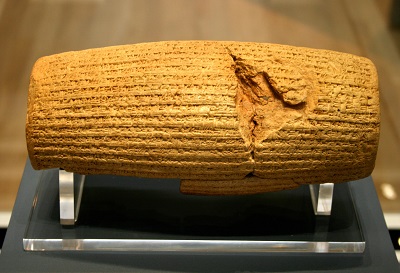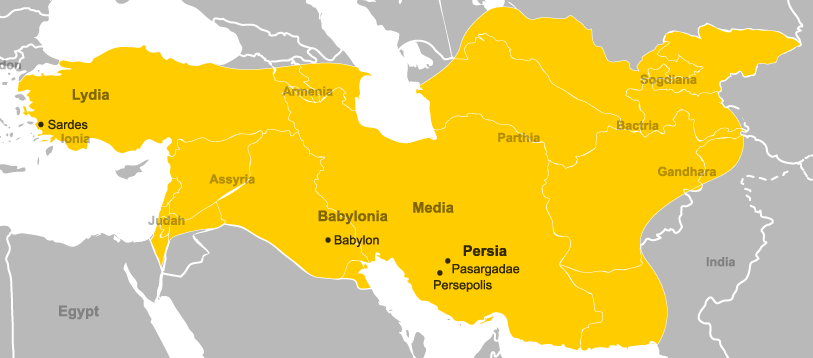To ask advice of the oracle, before he took any final decision, was a step which no pious king would omit.
Continuing Cyrus Begins the Persian Empire,
our selection from A History of Greece by George Grote published in 1856. For works benefiting from the latest research see the “More information” section at the bottom of these pages. The selection is presented in seven easy 5 minute installments.
Previously in Cyrus Begins the Persian Empire.
Time: 600 – 530 BC
Place: Near East

CC BY-SA 4.0 image from Wikipedia.
According to the representation of Herodotus, the war between Cyrus and Croesus of Lydia began shortly after the capture of Astyages, and before the conquest of Bactria. Croesus was the assailant, wishing to avenge his brother-in-law, to arrest the growth of the Persian conqueror, and to increase his own dominions. His more prudent counsellors in vain represented to him that he had little to gain, and much to lose, by war with a nation alike hardy and poor. He is represented as just at that time recovering from the affliction arising out of the death of his son.
To ask advice of the oracle, before he took any final decision, was a step which no pious king would omit. But in the present perilous question, Croesus did more — he took a precaution so extreme, that if his piety had not been placed beyond all doubt by his extraordinary munificence to the temples, he might have drawn upon himself the suspicion of a guilty scepticism. Before he would send to ask advice respecting the project itself, he resolved to test the credit of some of the chief surrounding oracles — Delphi, Dodona, Branchidae near Miletus, Amphiaraus at Thebes, Trophonius at Labadeia, and Ammon in Libya. His envoys started from Sardis on the same day, and were all directed on the hundredth day afterward to ask at the respective oracles how Croesus was at that precise moment employed. This was a severe trial: of the manner in which it was met by four out of the six oracles consulted we have no information, and it rather appears that their answers were unsatisfactory. But Amphiaraus maintained his credit undiminished, while Apollo at Delphi, more omniscient than Apollo at Branchidæ, solved the question with such unerring precision, as to afford a strong additional argument against persons who might be disposed to scoff at divination. No sooner had the envoys put the question to the Delphian priestess, on the day named, “What is Croesus now doing?” than she exclaimed in the accustomed hexameter verse, “I know the number of grains of sand, and the measures of the sea: I understand the dumb, and I hear the man who speaks not. The smell reaches me of a hard-skinned tortoise boiled in a copper with lamb’s flesh — copper above and copper below.” Croesus was awe-struck on receiving this reply. It described with the utmost detail that which he had been really doing, so that he accounted the Delphian oracle and that of Amphiaraus the only trustworthy oracles on earth — following up these feelings with a holocaust of the most munificent character, in order to win the favor of the Delphian god. Three thousand cattle were offered up, and upon a vast sacrificial pile were placed the most splendid purple robes and tunics, together with couches and censers of gold and silver; besides which he sent to Delphi itself the richest presents in gold and silver — statues, bowls, jugs, etc., the size and weight of which we read with astonishment; the more so as Herodotus himself saw them a century afterwards at Delphi. Nor was Croesus altogether unmindful of Amphiaraus, whose answer had been creditable, though less triumphant than that of the Pythian priestess. He sent to Amphiaraus a spear and shield of pure gold, which were afterward seen at Thebes by Herodotus: this large donative may help the reader to conceive the immensity of those which he sent to Delphi.
The envoys who conveyed these gifts were instructed to ask at the same time, whether Croesus should undertake an expedition against the Persians — and if so, whether he should solicit any allies to assist him. In regard to the second question, the answer both of Apollo and of Amphiaraus was decisive, recommending him to invite the alliance of the most powerful Greeks. In regard to the first and most momentous question, their answer was as remarkable for circumspection as it had been before for detective sagacity: they told Croesus that if he invaded the Persians, he would subvert a mighty monarchy. The blindness of Croesus interpreted this declaration into an unqualified promise of success: he sent further presents to the oracle, and again inquired whether his kingdom would be durable. “When a mule shall become king of the Medes (replied the priestess) then must thou run away — be not ashamed.”
Continued below the map.

CC BY-SA 3.0 image from Ancient History Encyclopedia.
More assured than ever by such an answer, Croesus sent to Sparta, under the kings Anaxandrides and Aristo, to tender presents and solicit their alliance. His propositions were favorably entertained — the more so, as he had before gratuitously furnished some gold to the Lacedaemonians for a statue to Apollo. The alliance now formed was altogether general — no express effort being as yet demanded from them, though it soon came to be. But the incident is to be noted, as marking the first plunge of the leading Grecian state into Asiatic politics; and that too without any of the generous Hellenic sympathy which afterward induced Athens to send her citizens across the Aegean. At this time Croesus was the master and tribute-exactor of the Asiatic Greeks, whose contingents seem to have formed part of his army for the expedition now contemplated; an army consisting principally, not of native Lydians, but of foreigners.
The river Halys formed the boundary at this time between the Median and Lydian empires: and Croesus, marching across that river into the territory of the Syrians or Assyrians of Cappadocia, took the city of Pteria, with many of its surrounding dependencies, inflicting damage and destruction upon these distant subjects of Ekbatana. Cyrus lost no time in bringing an army to their defense considerably larger than that of Croesus; trying at the same time, though unsuccessfully, to prevail on the Ionians to revolt from him. A bloody battle took place between the two armies, but with indecisive result: after which Croesus, seeing that he could not hope to accomplish more with his forces as they stood, thought it wise to return to his capital, and collect a larger army for the next campaign. Immediately on reaching Sardis he dispatched envoys to Labynetus king of Babylon; to Amasis, king of Egypt; to the Lacedæmonians, and to other allies; calling upon all of them to send auxiliaries to Sardis during the course of the fifth month. In the meantime he dismissed all the foreign troops who had followed him into Cappadocia.
| <—Previous | Master List | Next—> |
More information here and here, and below.
We want to take this site to the next level but we need money to do that. Please contribute directly by signing up at https://www.patreon.com/history
Like!! I blog quite often and I genuinely thank you for your information. The article has truly peaked my interest.